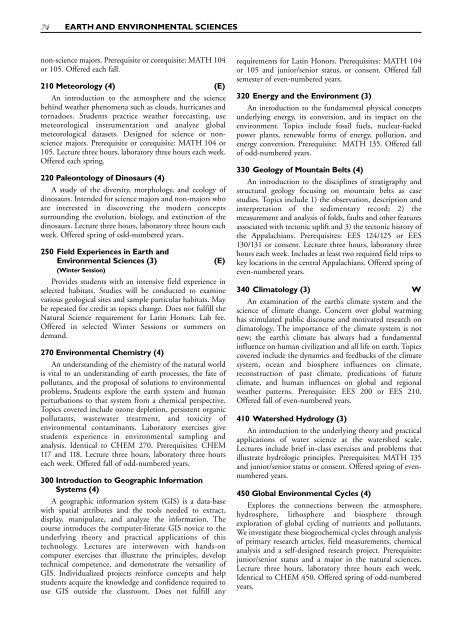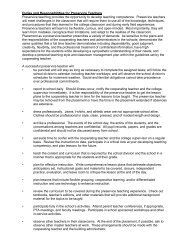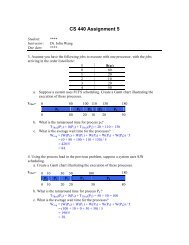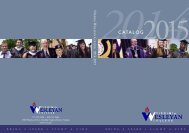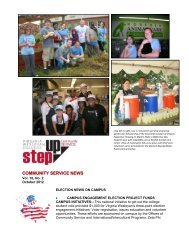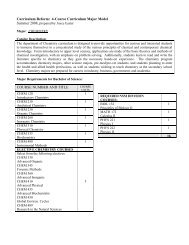2008-2009 Catalog - Virginia Wesleyan College
2008-2009 Catalog - Virginia Wesleyan College
2008-2009 Catalog - Virginia Wesleyan College
- No tags were found...
You also want an ePaper? Increase the reach of your titles
YUMPU automatically turns print PDFs into web optimized ePapers that Google loves.
74 EARTH AND ENVIRONMENTAL SCIENCESnon-science majors. Prerequisite or corequisite: MATH 104or 105. Offered each fall.210 Meteorology (4) (E)An introduction to the atmosphere and the sciencebehind weather phenomena such as clouds, hurricanes andtornadoes. Students practice weather forecasting, usemeteorological instrumentation and analyze globalmeteorological datasets. Designed for science or nonsciencemajors. Prerequisite or corequisite: MATH 104 or105. Lecture three hours, laboratory three hours each week.Offered each spring.220 Paleontology of Dinosaurs (4)A study of the diversity, morphology, and ecology ofdinosaurs. Intended for science majors and non-majors whoare interested in discovering the modern conceptssurrounding the evolution, biology, and extinction of thedinosaurs. Lecture three hours, laboratory three hours eachweek. Offered spring of odd-numbered years.250 Field Experiences in Earth andEnvironmental Sciences (3)(Winter Session)(E)Provides students with an intensive field experience inselected habitats. Studies will be conducted to examinevarious geological sites and sample particular habitats. Maybe repeated for credit as topics change. Does not fulfill theNatural Science requirement for Latin Honors. Lab fee.Offered in selected Winter Sessions or summers ondemand.270 Environmental Chemistry (4)An understanding of the chemistry of the natural worldis vital to an understanding of earth processes, the fate ofpollutants, and the proposal of solutions to environmentalproblems. Students explore the earth system and humanperturbations to that system from a chemical perspective.Topics covered include ozone depletion, persistent organicpollutants, wastewater treatment, and toxicity ofenvironmental contaminants. Laboratory exercises givestudents experience in environmental sampling andanalysis. Identical to CHEM 270. Prerequisites: CHEM117 and 118. Lecture three hours, laboratory three hourseach week. Offered fall of odd-numbered years.300 Introduction to Geographic InformationSystems (4)A geographic information system (GIS) is a data-basewith spatial attributes and the tools needed to extract,display, manipulate, and analyze the information. Thecourse introduces the computer-literate GIS novice to theunderlying theory and practical applications of thistechnology. Lectures are interwoven with hands-oncomputer exercises that illustrate the principles, developtechnical competence, and demonstrate the versatility ofGIS. Individualized projects reinforce concepts and helpstudents acquire the knowledge and confidence required touse GIS outside the classroom. Does not fulfill anyrequirements for Latin Honors. Prerequisites: MATH 104or 105 and junior/senior status, or consent. Offered fallsemester of even-numbered years.320 Energy and the Environment (3)An introduction to the fundamental physical conceptsunderlying energy, its conversion, and its impact on theenvironment. Topics include fossil fuels, nuclear-fueledpower plants, renewable forms of energy, pollution, andenergy conversion. Prerequisite: MATH 135. Offered fallof odd-numbered years.330 Geology of Mountain Belts (4)An introduction to the disciplines of stratigraphy andstructural geology focusing on mountain belts as casestudies. Topics include 1) the observation, description andinterpretation of the sedimentary record; 2) themeasurement and analysis of folds, faults and other featuresassociated with tectonic uplift and 3) the tectonic history ofthe Appalachians. Prerequisites: EES 124/125 or EES130/131 or consent. Lecture three hours, laboratory threehours each week. Includes at least two required field trips tokey locations in the central Appalachians. Offered spring ofeven-numbered years.340 Climatology (3) WAn examination of the earth’s climate system and thescience of climate change. Concern over global warminghas stimulated public discourse and motivated research onclimatology. The importance of the climate system is notnew; the earth’s climate has always had a fundamentalinfluence on human civilization and all life on earth. Topicscovered include the dynamics and feedbacks of the climatesystem, ocean and biosphere influences on climate,reconstruction of past climate, predications of futureclimate, and human influences on global and regionalweather patterns. Prerequisite: EES 200 or EES 210.Offered fall of even-numbered years.410 Watershed Hydrology (3)An introduction to the underlying theory and practicalapplications of water science at the watershed scale.Lectures include brief in-class exercises and problems thatillustrate hydrologic principles. Prerequisites: MATH 135and junior/senior status or consent. Offered spring of evennumberedyears.450 Global Environmental Cycles (4)Explores the connections between the atmosphere,hydrosphere, lithosphere and biosphere throughexploration of global cycling of nutrients and pollutants.We investigate these biogeochemical cycles through analysisof primary research articles, field measurements, chemicalanalysis and a self-designed research project. Prerequisite:junior/senior status and a major in the natural sciences.Lecture three hours, laboratory three hours each week.Identical to CHEM 450. Offered spring of odd-numberedyears.


